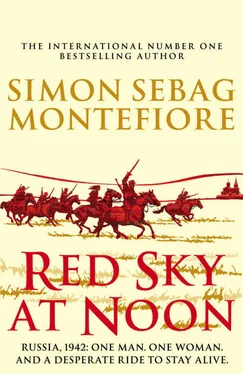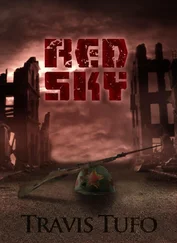‘It’s a trick,’ Stalin had said. ‘It’s classic disinformation. The bastards expect us to fall for this? The southern offensive will be a diversion. The big offensive will be against Moscow.’ The three Politburo members had agreed – as they always did. But now it was clear they had called it wrong and Hitler’s panzers were charging across the southern plains towards Stalingrad. Russia was about to be cut in half.
Stalin looked down the table at the only other man in the huge room, General Alexander Vasilevsky, his Chief of Staff, who was leaning over a map of the southern theatre, marked with arrows and symbols. ‘Comrade Vasilevsky?’
Vasilevsky, who had the professional air of an old-fashioned Tsarist officer, stood up straight. ‘He’s right, Comrade Stalin. This is the main offensive.’
Stalin nodded, rubbing his face with his hands. Ripples of exhaustion seemed to emanate from him. Satinov could only admire Stalin’s self-control, the steely, intelligent coldness that he radiated despite his egregious mistakes. But he had aged in this past year of war; his clothes hung off him.
The padded door opened silently and a dwarfish figure, Alexander Poskrebyshev, also in boots and uniform, looked in: ‘They’re here, Comrade Stalin,’ he announced.
Stalin beckoned, and two old cavalrymen entered and stood at attention before him. Both had just flown in from the front and been driven straight to the Kremlin. The dust of battle was still on their faces, and Satinov could smell their sweat, and their despair.
‘Report, Comrade Budyonny,’ commanded Stalin in his light tenor voice.
‘German Army Group A has broken through the North Caucasus Front,’ said Marshal Budyonny, his barrel chest, his rider’s bow legs in boots and red-striped britches, even his magnificently waxed moustaches, diminished in defeat. ‘Our troops are in retreat. They’ve reached the Don, and are breaking into the Caucasus, targeting the oil fields. We are struggling to regroup. Rostov has fallen.’
‘Rostov?’ repeated Stalin.
‘A lie! You’re spreading panic,’ cried Beria. ‘Report properly!’
But Budyonny ignored him. In 1937, when they had tried to arrest him during the Terror, Budyonny had drawn his pistol and threatened to kill them and shoot himself, shouting, ‘Get Stalin on the line!’ Stalin had cancelled the arrest order.
‘Our forces fell back from Rostov,’ said Budyonny. ‘They turned and fled. Just ran! I admit there was cowardice and incompetence. I take full responsibility.’
‘And you, Marshal Timoshenko?’ Stalin turned to the other cavalryman. ‘What good news have you got for us?’
Timoshenko shook his gleaming bald head. ‘The Stalingrad Front is in disarray. German forces have reached the Don and the only thing holding them back are two armies defending the bend in the river. And we can’t hold Voronezh. I would say…’ He struggled to speak.
‘Tell Comrade Stalin the truth!’ said Beria.
‘I think Stalingrad itself in danger.’
Stalingrad! Stalin’s own city where he made his name in the Civil War. Satinov felt breathless suddenly with disbelief.
‘That’s a lie! Stalingrad will never fall,’ said Beria in his clotted Mingrelian accent. ‘Panic-mongers should be shot! The Germans are hundreds of miles from Stalingrad.’
Stalin’s hazel eyes flicked towards Vasilevsky, who was plotting the new information on the maps spread on the table. He trusted Vasilevsky. ‘Well?’
Vasilevsky appeared to consider his answer unhurriedly.
‘We will halt the German forces on the Don Bend but the defence and fortification of Stalingrad must be urgently prepared along with evacuation plans for the tank factories. I propose a radical reconstruction of the southern fronts and I’ve informed them to expect new orders from Stavka.’
Stalin thought for a moment and lit a Herzegovina Flor cigarette. In the silent room, with the two marshals standing to attention, with Vasilevsky again perusing the maps, the three henchmen waiting, the wheeze of every breath of smoke seemed laden with fearsome concentration.
‘Timoshenko, Budyonny, wait outside,’ said Stalin.
The two men saluted and left the room.
‘Of course Stalingrad is not threatened. Not yet. But I will not tolerate a single step back. Not one step back…’ He allowed this phrase to sink in.
‘Comrade Stalin,’ said Satinov after a pause. ‘The Hitlerites have very successfully used penal battalions in battle made up of court-martialled soldiers and criminal elements. We have punishment units of cowards and criminals already being trained, some recruited in the Gulags, but I propose we formalize this structure, and create penal battalions on every front and throw them into battle…’
‘Desperate men fight like devils,’ said Stalin. ‘Very well.’ He lifted one of the many Bakelite phones on his desk, ‘Get in here.’
Poskrebyshev appeared at the door, notebook and pencil already in hand. ‘Take this down,’ Stalin ordered. ‘Order 227 from the People’s Commissar of Defence.’ He stood and started to pace up and down, his hands shaking as he inhaled his cigarette. ‘Telegraph this to all fronts. To be read to all units urgently on this very night… The enemy throws new forces against us… The German invaders penetrate towards Stalingrad… they’ve already captured Novocherkask, Rostov-on-Don, half Voronezh… Our soldiers, encouraged by panic-mongers, shamefully abandoned Rostov… I order: Not One Step Back…’
‘Not One Step Back! That is our slogan!’
In the sultry heat of the manège’s arena, Melishko was reading out Stalin’s orders which had just arrived, smoking off the telegraph from Moscow. Benya felt the hair rising on his neck. His life was entering a new and daunting stage.
‘Stavka orders: “Every army must form well-armed blocking squads (two hundred men) and place them behind any unstable divisions. In the case of any retreat, they are to shoot panic-mongers and cowards on the spot… Not One Step Back… We are already training punishment units of prisoners.’ Benya and his comrades concentrated; Stalin himself was addressing them and their destiny. ‘Now I order the formation of penal battalions – shtrafnoi batalioni – of eight hundred persons on every front made up of men guilty of crimes, breaches of discipline due to cowardice or confusion. They are to be placed in the most difficult sectors of the battle to give them the chance to redeem their sins against the Motherland by the shedding of their own blood… These are the orders of our Motherland. This is to be read to all companies, cavalry squadrons, batteries and headquarters. People’s Commissar of Defence. J Stalin.”’
Melishko folded the paper and peered grimly at his ‘bandits’. ‘Comrade Stalin has spoken and—’
‘Permission to speak!’ a voice called out. Melishko nodded.
‘What does “redeeming sins by shedding blood” mean?’ said Prishchepa. Only he would have dared ask such a thing.
Melishko wiped the sweat from his forehead into the wisps of his meagre rust-coloured hair. The men waited; Benya could feel them craning forward.
‘Comrade Stalin means that there are only two ways to earn your freedom. Death or by being wounded in battle.’
The men held their breath for a moment as they, like Benya, absorbed the primitive simplicity of their fates.
‘See, my bandits?’ said Melishko. ‘You have the chance to free yourselves in battle. Your deployment is imminent. Get some rest tonight… Yes, comrade?’
Ganakovich whispered in Melishko’s ear.
‘Right,’ said Melishko. ‘Comrade Ganakovich will tell you more.’
Captain Ganakovich swaggered to the front. ‘Lads, comrades, muckers, Shtrafniki,’ he started in a deep voice of rasp and raunch that he adopted for momentous occasions. ‘You bear the taint of alien elements, bourgeois illiterates, counter-revolutionary delinquents, murderous degenerates, but you’ve been re-educated and retrained and now you have the honour to fight for the Socialist Motherland and the Great Genius Stalin – and I’ll be right there with you, shoulder to shoulder!’ Ganakovich was in Stalinist commissar mode as he drew his pistol and held it above his head. ‘As convicts and cowards, you have no rights as soldiers. You will not even be informed of the name of your front, and there’ll be no maps for you. You will gratefully receive your mission and you will fulfil it. If I or the Special Unit notice the slightest hesitation, deviation, insubordination, a word, a look, yes, even a thought, you’ll get the Eight Grammes: instant execution!’ He gulped – he had a tendency when excited to forget to swallow his saliva, which then built up in his mouth until it had to be consumed in one phlegmy wad.
Читать дальше












